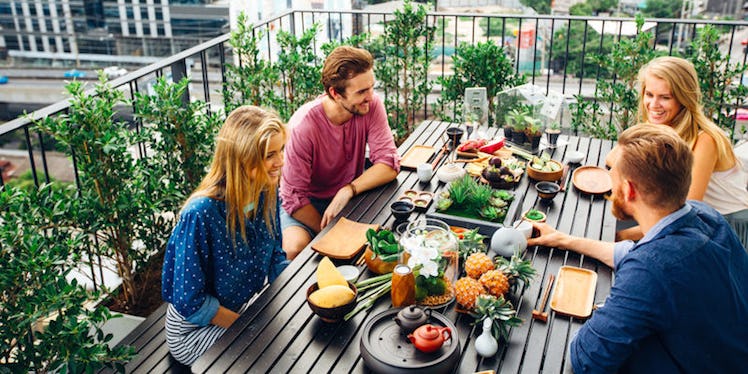Growing up, many of us don't realize the impact of our actions. We say things we don't mean to people we love, drink until we can't see straight and eat food that wreaks havoc on our body. Here's the problem, though: All of our actions have consequences. Whether or not we realize it at the time doesn't matter.
Growing up in rural Pennsylvania, I ate traditional Pennsylvania Dutch food that my grandmother made my mom, so it mostly revolved around meat and potatoes. I wasn't introduced to the concept of veganism until I met my best friend, Elizabeth. We bonded over a lot as we grew up together and shared a mutual love of movies, coffee and shenanigans. In high school, I remember very specifically the day that Elizabeth decided to go vegan. She explained to me her reasoning, and I said, "OK, that makes sense to me, and I support you." Why? Because that's what you do when your best friend is passionate about something.
After Elizabeth made some slow and steady changes, I started to think about my impacts on Earth. Here is how she changed the way that I view sustainable living.
1. Packaging reduction became important.
There's an incredible amount of waste that goes into food packaging. I understand, it's important to keep bad bacteria out and keep us healthy. But the problem here lies in the lack of recycling. In the US, 2.5 million plastic bottles are thrown out every hour and less than 3 percent are recycled. Take a moment and let that sink in. There is an incredible amount of general waste being created every day, so, thanks to Elizabeth, I made simple changes like carrying a reusable water bottle and coffee thermos with me everywhere. When I shop, I use a reusable shopping bag and buy items in bulk. She had opened my eyes to the little ways you can make a positive impact.
2. Food waste was eliminated.
Here's a fact that is going to blow your mind: In 2010, over 33 million tons of food reached landfills in the US — equivalent to half a pound per person per day. In comparison, that's enough food to fill the Rose Bowl stadium every day. Elizabeth gave me some starting ideas on how to begin reducing my food waste. Now, I don't purchase something at the market or grocery store unless I have a specific meal in mind to use it with, or at least a few hours that I can devote to cooking and eating. In general, one of the best ways to reduce food waste is to plan, plan and plan some more.
3. A renewed focus on energy.
Once I started paying more attention to these small details in my life, I also started to think about how I could cook my food in a more sustainable way. I had read about solar panels for years, and it was well-known that they can reduce your utility bills and lessen your dependence on fossil fuels. Solar panels are an investment that I plan on making in my future home so that I can produce energy and cook in an increasingly sustainable manner. Elizabeth emphasized that one of the best things you can do is to cook your own meals at home. This way, restaurants aren't wasting resources making your meal, and you're not driving to a local restaurant. Don't get me wrong, I still treat myself on occasion, but I mostly rely on cooking at home to reduce my impact on Earth by cooking at home and using ingredients that I source locally.
4. Farmer's market friendly.
One of the biggest impressions Elizabeth made on me, is the impact that buying from big-box stores makes on Earth. Food from a farmer's market has a much shorter route to its final destination compared to foods you'll find elsewhere. In some larger markets, you may even find organic farmers, who have an even lower impact on Earth compared to conventional farmers. Now, I make a weekly trip of walking to my local farmer's market and shopping for produce there. As an added bonus, it's a great way to support your community and meet new people, rather than lining the pockets of a corporation.
5. Vegging out.
A few months after Elizabeth's transition to veganism, I made the leap to pescatarian and then eventually decided to cut out meat completely from my diet. This was a personal decision, but I'd be lying if I said Elizabeth didn't influence my decision. My family had a hard time accepting my decision to be a vegetarian at first, but they eventually came around. My mom has even tried eating less meat, and will cook vegetarian meals with me when I visit. My dad will never change, and I'm OK with that, but he's added a few pretty solid dad jokes about animal crackers to his usual repertoire. What's important to me though is that, through some small measure, I am helping to reduce the impact on our Earth and finding new ways to bond with my family.
In many ways, Elizabeth, who is my closest friend, has improved my life. We've laughed together, cried together and seen the world together. I wouldn't trade her friendship for anything. I'll be honest, making some of these changes to be more sustainable were difficult, and not always convenient. But I'm thankful for Elizabeth, because without her, and people like her, our world would have a dimmer outlook.
